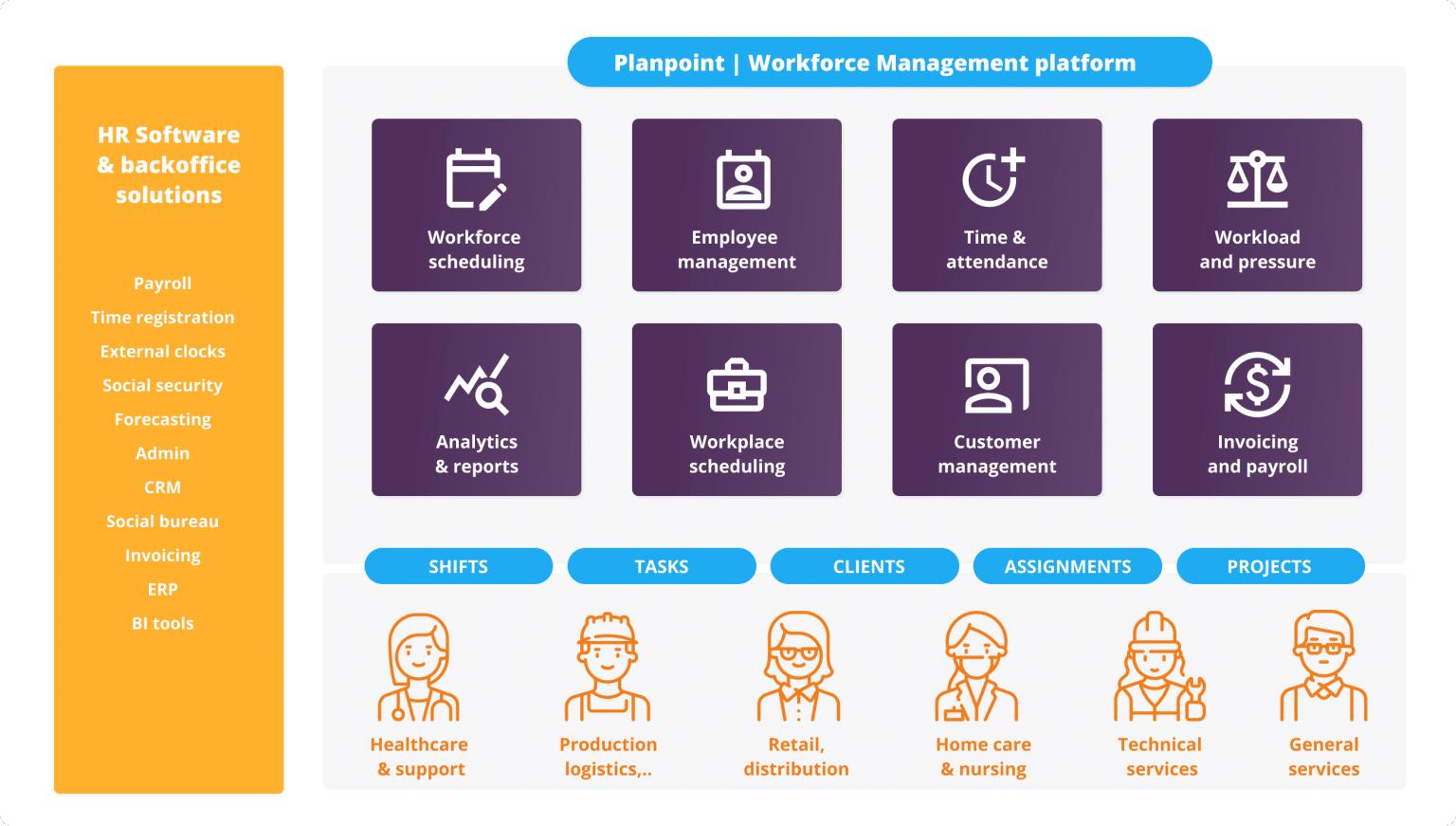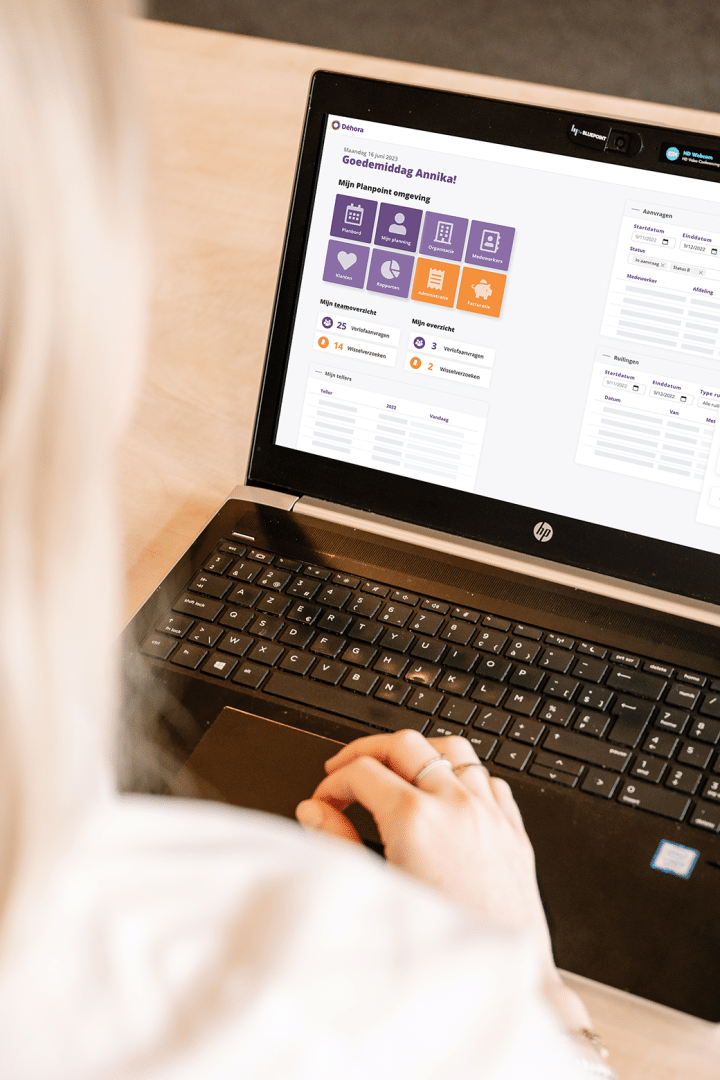
Different planning methods in one software platform? Yes, it’s possible!
Whether it’s about scheduling shifts, coordinating tasks, or planning customer appointments: effective workforce planning ensures that your organization runs smoothly. But what to do when different departments within your organization each have their own planning method? There’s an ideal solution for that!
Each department its own workforce planning?
In an organization with multiple departments or business units, each department often has unique requirements and preferences when it comes to workforce planning. For instance, a department that needs to schedule 24/7 care services requires a completely different staffing approach than a department focused on project planning or customer appointments. It is important that each department has the freedom to choose the planning method that best fits their specific working method and needs. But how do you ensure that this diversity doesn’t lead to chaos and inefficiency? Especially when employees need to be interchangeable between departments or when resources need to be shared.
Lots of variety, little efficiency
When different departments use their own planning methods, a complex planning issue arises. Each department operates in its own way, with different rules for working hours and separate agreements with employees. This leads to the creation of separate ‘units,’ and these ‘units’ communicate little or not at all with each other. As a result, it becomes difficult to get a complete overview of the staffing across your organization. This sometimes leads to situations where one department has an excess of employees while another department struggles with understaffing, even at crucial moments. And we haven’t even mentioned resources and software: different departments within the same organization often use different software to keep track of work schedules or working hours. It is precisely in this situation that it is important to bring all these different planning needs together, allowing you to deploy your staff more efficiently and intelligently as an organization.
Planpoint: Multiple planning methods in one WFM platform
The big challenge lies in seamlessly aligning all these different departments and systems, without losing sight of the unique needs of each department. Planpoint offers the perfect solution by bringing all these diverse planning needs together in one platform without compromising on flexibility or ease of use.
This unique workforce management platform allows each department to retain its own planning methods, while the entire organization works within one integrated platform. This means that each department can continue to use its specific approach without leading to planning conflicts. Planpoint is flexible enough to support different planning models, allowing each department to function optimally.
Cross-departmental planning
In an organization where employees work across different departments, cross-departmental planning is a must. Planpoint offers real-time insight into the availability and staffing of all departments, making integrated planning possible. As a result, employees can be efficiently deployed where they are most needed, leading to increased productivity and a better balance between workload and available resources.
Sharing common resources
In addition to maintaining department-specific planning, Planpoint makes it easy to share resources between departments. This means that employees can be flexibly deployed without causing planning conflicts. Planpoint provides insight into the availability of personnel and other resources across the entire organization, enabling quick and effective adjustments.
Scalability
With Planpoint, it’s possible to start small and expand the services on the platform when the organization or department is ready. Whether you add one department or several at once, Planpoint grows along your organization. This allows you to transition gradually without being forced into a full implementation on day one.
Implementation and maintenance
One of the major benefits of Planpoint is the cost savings it delivers by using one WFM platform for multiple departments. This not only simplifies implementation and maintenance but also provides significant financial benefits. Instead of wasting time and resources on implementing different software packages for each department, a single implementation of Planpoint is sufficient. This simplifies project management and significantly reduces implementation time, directly leading to lower costs.
Improved integrations
Planpoint integrates seamlessly with existing business applications such as HR systems, payroll, and ERP software. This integrated approach enhances collaboration between departments and makes sharing information and resources easier, leading to higher operational efficiency.
Extra benefit: everyone uses the same tool
In addition to the technical and financial benefits, using a single WFM platform like Planpoint also offers significant advantages in terms of user-friendliness and collaboration. Employees only need to master one user interface, shortening the learning curve and boosting productivity. Additionally, the uniform use of the same software provides a significant gain in training and education efforts. All employees go through the same training process and become familiar with the same functionalities. This makes it easy for colleagues to support each other with questions, reducing the dependence on IT support and shortening the onboarding period for new employees. This shared knowledge strengthens collaboration and increases efficiency within the organization.
In conclusion
Implementing a single workforce management platform like Planpoint for multiple departments within an organization offers significant benefits in terms of simplicity, cost savings, integration, and ease of use. By utilizing existing interfaces and infrastructure, not only is the learning curve reduced, but the efficiency and productivity of the organization as a whole are also increased. This allows organizations to plan and operate with maximum effectiveness, while each department can retain its unique planning methods.

Discover the possibilities of Planpoint
We are looking forward to showing you all the features that Planpoint has to offer. Schedule an appointment right away.


